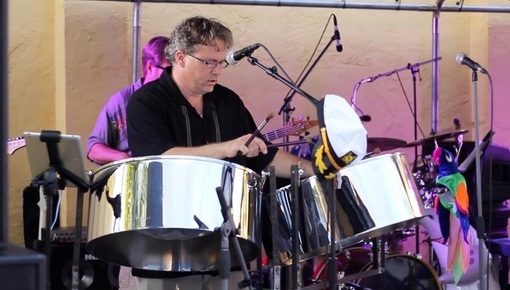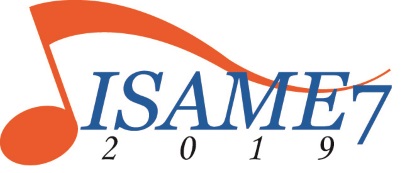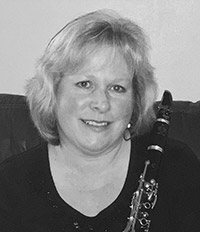UF Music Education Grad Becomes a Published Composer
Comments Off on UF Music Education Grad Becomes a Published ComposerSoftware tools and online connections have transformed the work of many composers, making it possible to create music from anywhere and share pieces instantly with people around the world. However, traditional sheet music publication remains a vital means of presenting new compositions to a broad audience of teachers and students.
That’s why it was so exciting when two pieces by Cooper Ford, a music teacher at North Brunswick Township High School, were recently accepted for publication. An alumnus of the online Master of Music in Music Education program at the University of Florida, Ford credits his graduate school experience with helping him reach this new milestone in his career. As both a teacher and a composer, he benefited from the lessons he learned in creativity, music theory, and educational technology.
The Next Step for a Music Educator
While completing his bachelor’s degree in music education at the College of New Jersey, Ford took courses in composition and theory. He went on to pursue opportunities for professional development throughout his years as a teacher and orchestra director. However, until now he never successfully submitted any of his compositions for publication. The turning point came when he decided to take his skills to the next level by earning a master’s degree.
“It was important for me to choose a program that was both the best I could find and affordable,” Ford explained.
He decided to apply to the UF master’s in music education after attending an online information session. During this session, Program Director and Professor William Bauer explained that completing this degree would require hard work and dedication, but it would also offer the opportunity to learn directly from some of the top thinkers in the field.
“He was true to his word,” Ford said. “Part of what amazed me about the program was that when I would read books or articles, my professors were either the authors or the people who were being quoted. These are people who are published and know their craft.”
And what was the other factor that convinced Ford to apply to UF? He liked the idea of becoming a member of The Gator Nation, identifying with the iconic mascot and global community of one of the top public universities in the U.S.
Harnessing Creativity
Ford found inspiration in a master’s in music education curriculum that covers topics such as music theory, instructional design, student assessment, creativity, and educational technology. In addition to learning from his professors, he connected with fellow educators from across the country, who all brought their own perspectives to classes designed specifically for their development as professionals and musicians.
For example, the course Approaches to Theoretical Analysis in Music Education (MUT6617) gave Ford the chance to examine classical pieces in depth and rethink how he wrote music himself. As an undergraduate, he had focused on traditional harmonic writing, but this master’s-level class instead emphasized the big picture of musical structure, form, and melody.
Creative Thinking in Music (MUE6399), which applies cognitive science insights to the processes of making music, proved to be especially influential for Ford. He began to consider how he could bring together convergent and divergent thinking in his compositional process, resulting in pieces that stayed within the parameters of the educational market for sheet music while still offering exciting ideas to catch the interest of young musicians and their directors.
“I spent a lot of time as part of the creative process getting to know pieces that had been published in the past five years, reading the publishers’ guidelines, and watching interviews with composers to learn from what they did to get published,” he explained. “Then, I tried to create music that was new and different within that box.”
Convergence and Divergence
Ford sent a piece he wrote for his course in creative thinking to publishers, but he was turned down. Still, he stayed at the piano, maintaining his determination as he went on to submit four more compositions.
For these compositions to succeed, Ford had to fulfill what publishers were looking for but also allow himself the freedom to improvise and develop engaging ideas. He knew the compositions should be developmentally appropriate for students learning their instruments as well as enjoyable for both players and listeners.
To achieve that appeal, he focused on the physical experience of movement and energy that young people have while learning stringed instruments. He set out to keep things interesting for the whole orchestra by including novel rhythms, unexpected elements, and opportunities for multiple instruments to take the lead on melody lines.
Ultimately, two of his works, both educational pieces for young orchestras, found publishers. Alfred Music accepted “Exhilaration,” which Ford wrote for relative newcomers to their instruments with around a year of experience. Carl Fischer Music agreed to publish a holiday piece that blended versions “We Three Kings” and “O Come O Come, Emmanuel” in an arrangement intended for advanced middle school or early high school musicians.
A New Era in Music Education
In addition to propelling his compositional accomplishments, the Master of Music in Music Education program expanded Ford’s horizons in the classroom. He used what he learned about recording software and vernacular musical genres to establish a high school class on music production that’s become so popular it routinely has a waiting list. Each semester, students, many of whom would never otherwise take a music class at the secondary level, learn how to build tracks using a digital audio workstation that’s loaded onto a computer.
Some of the same skills and tools enabled Ford to keep students involved in remote learning during the height of the COVID-19 pandemic. When it was impossible to teach traditional orchestra classes, he shifted toward facilitating students’ progress by showing them how to record themselves playing and edit the resulting tracks. These shifts paved the way for long-term changes in the orchestra program that would embrace technological possibilities and a more diverse range of compositions.
“Being creative is a trait people often seek in the real world, but I don’t think it’s often taught,” Ford said. “As a music teacher, I want my students to learn to be creative and have those tools to apply to their life.”
Ford hopes that his students will someday publish their own compositions, and in the meantime plans to continue writing music for publication himself. He says that completing a master’s degree was like “drinking from a firehose,” helping him build the skills and motivation to take on new challenges. His graduate education was just one movement in the larger trajectory of his professional growth as a musician, composer, and educator.
About the University of Florida’s Online Master of Music in Music Education
The University of Florida’s online Master of Music in Music Education program is designed with the evolution of music education in mind. In addition to covering a broad array of music genres, the program’s curriculum explores advanced concepts in music education psychology, instructional design, and technology in the music classroom. The faculty includes instructors who have a wide range of professional backgrounds—from professional musicians to internationally recognized music education researchers and authors. Visit our success stories page to learn more about current and former music education master’s students who have taken advantage of the opportunities at UF to achieve their goals.



 Music teachers are increasingly using technology when developing new strategies for engaging students. Where we once thought of acoustic instruments, pencil, and paper as primary learning tools, it is now possible to involve students in creative music learning using technologies such as
Music teachers are increasingly using technology when developing new strategies for engaging students. Where we once thought of acoustic instruments, pencil, and paper as primary learning tools, it is now possible to involve students in creative music learning using technologies such as  The great Chinese philosopher Confucius wrote “Music produces a kind of pleasure which human nature cannot do without,” nearly 2,500 years ago. This truth remains; music is a life force that nurtures the human spirit, provides inspiration, and awakens creativity. Our lives would not be complete without music. Teaching is as much of an art as music, or any other discipline. When musical passion and teaching combine, students of all ages flourish.
The great Chinese philosopher Confucius wrote “Music produces a kind of pleasure which human nature cannot do without,” nearly 2,500 years ago. This truth remains; music is a life force that nurtures the human spirit, provides inspiration, and awakens creativity. Our lives would not be complete without music. Teaching is as much of an art as music, or any other discipline. When musical passion and teaching combine, students of all ages flourish.

 Teachers are change agents. They encourage, motivate and lead students to new paths of discovery. Whatever the subject, teachers make a profound impact on their students, and society as a whole. Music teachers have the added joy of fostering creative energy from their students and helping to nourish innate talents and gifts.
Teachers are change agents. They encourage, motivate and lead students to new paths of discovery. Whatever the subject, teachers make a profound impact on their students, and society as a whole. Music teachers have the added joy of fostering creative energy from their students and helping to nourish innate talents and gifts.
 Growing as a music educator means trying your hand at unfamiliar instruments and techniques, engaging with the cultures from which they come. Edwin Anderson, a Florida-based teacher, percussionist, and composer, embodies this spirit of exploration. He’s devoted much of his career to introducing musicians of all ages to the possibilities of steel band music, from his elementary school students to fellow music teachers.
Growing as a music educator means trying your hand at unfamiliar instruments and techniques, engaging with the cultures from which they come. Edwin Anderson, a Florida-based teacher, percussionist, and composer, embodies this spirit of exploration. He’s devoted much of his career to introducing musicians of all ages to the possibilities of steel band music, from his elementary school students to fellow music teachers. Some of our most vivid memories come from the music classroom. Remember the first time you picked up an instrument and got it to make a sound? It might not have been the right sound, but there’s nothing quite like that moment of realization: You have the ability to create — to play.
Some of our most vivid memories come from the music classroom. Remember the first time you picked up an instrument and got it to make a sound? It might not have been the right sound, but there’s nothing quite like that moment of realization: You have the ability to create — to play.
 Music instructor and clarinetist Michelle Lucia-Ingle’s research on using software applications to learn, teach and play clarinet has taken her from the University of Florida’s
Music instructor and clarinetist Michelle Lucia-Ingle’s research on using software applications to learn, teach and play clarinet has taken her from the University of Florida’s